Abstract
The prevalence of nausea and emesis among a series of out-patients (n = 95) receiving mainly mild-to moderately-emetic cytotoxics, was assessed, along with levels of psychological morbidity. Particular focus was given to the rates of psychologically-based (anticipatory) nausea and emesis. Results indicated that 23% of patients experienced anticipatory nausea and the majority reported that this occurred before at least half of the previous treatment cycles. Both emetic challenge of chemotherapy regimen and younger age were linked to this anticipatory effect. The data clearly indicated that nausea and emesis, both post-treatment and in anticipation of treatment, carried a psychological cost with anxiety being highest in those experiencing anticipatory nausea and/or emesis. The role of anxiety in the aetiology of psychologically-based nausea and emesis was not evaluated and it is considered that a prospective study is needed to clarify the exact contribution of psychological factors in the incidence of both post-treatment and anticipatory side-effects.
Full text
PDF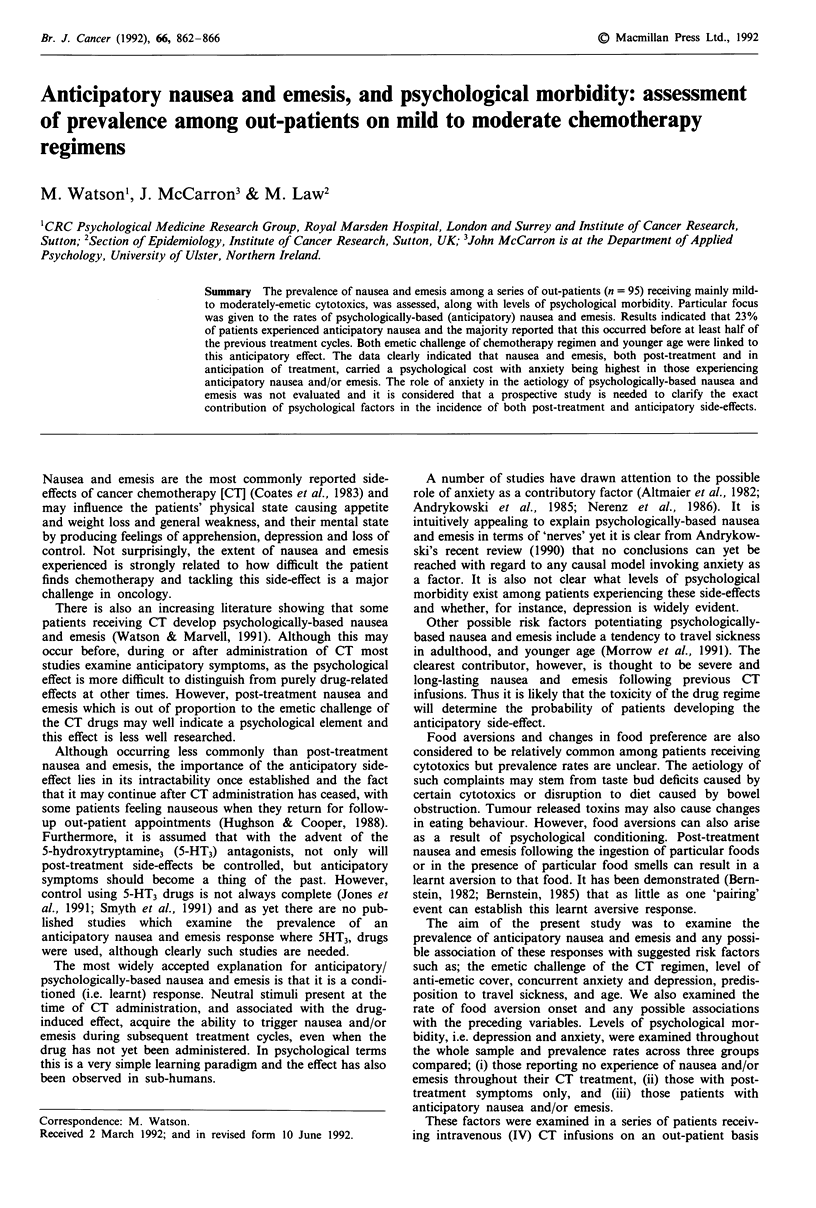
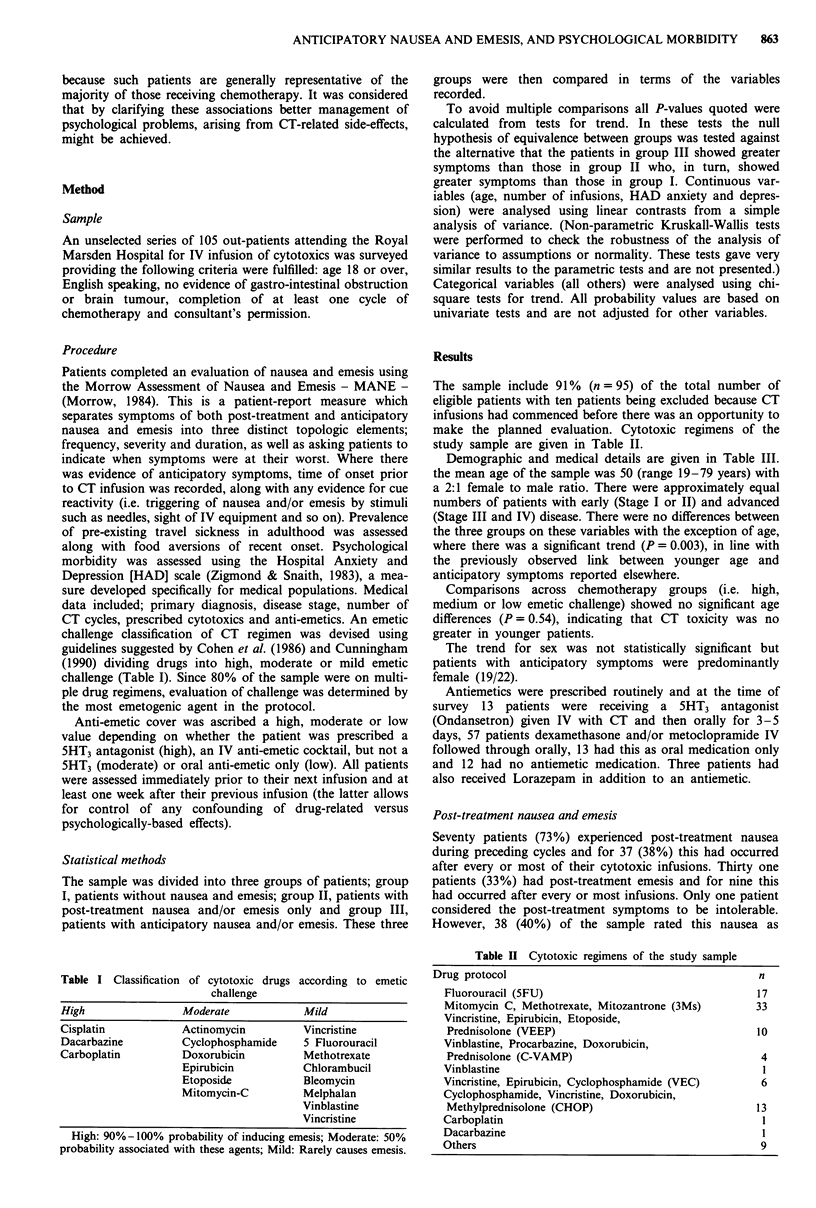
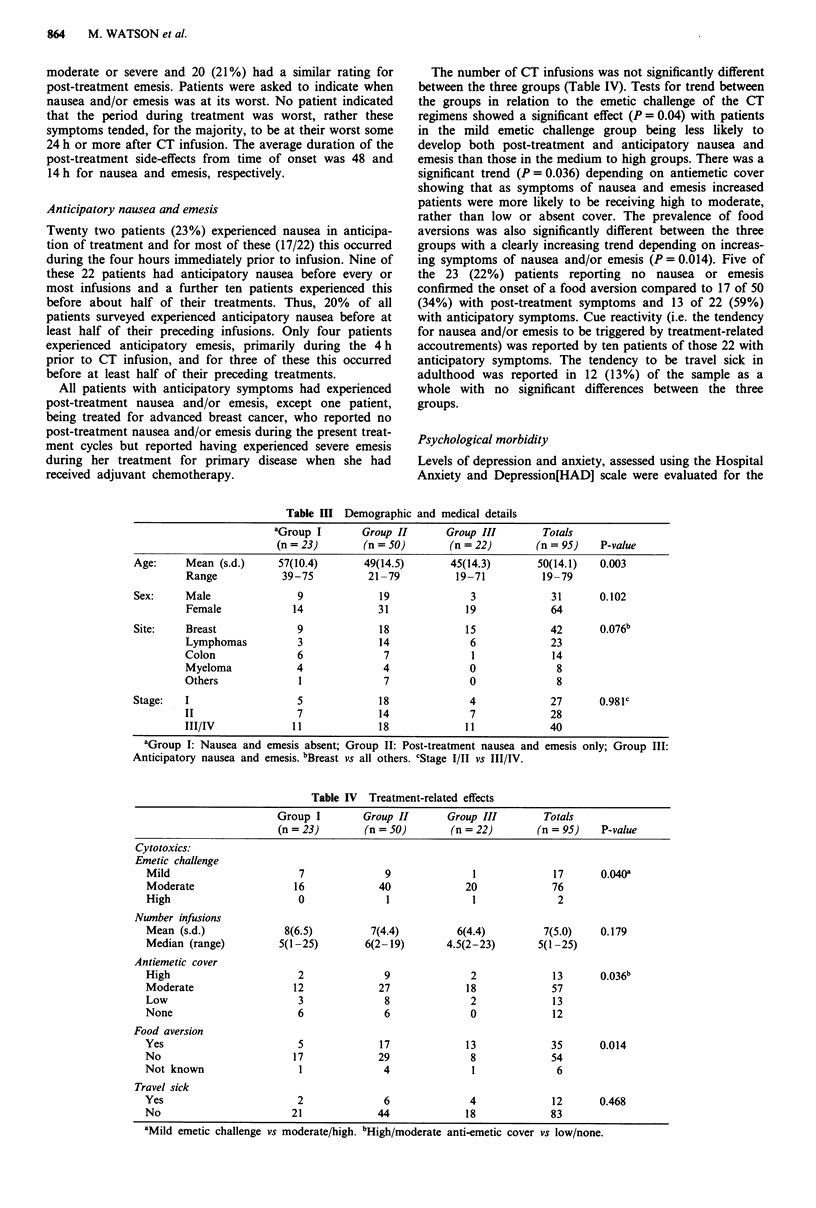
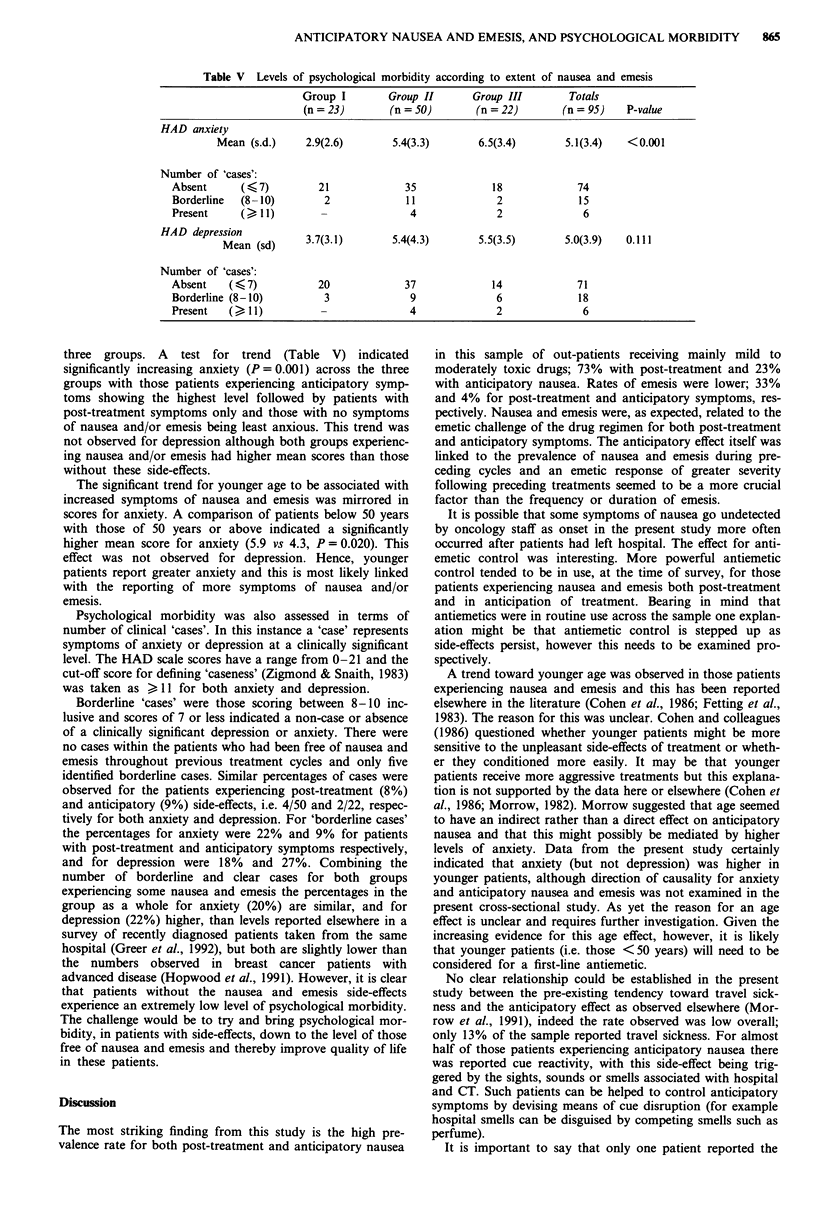
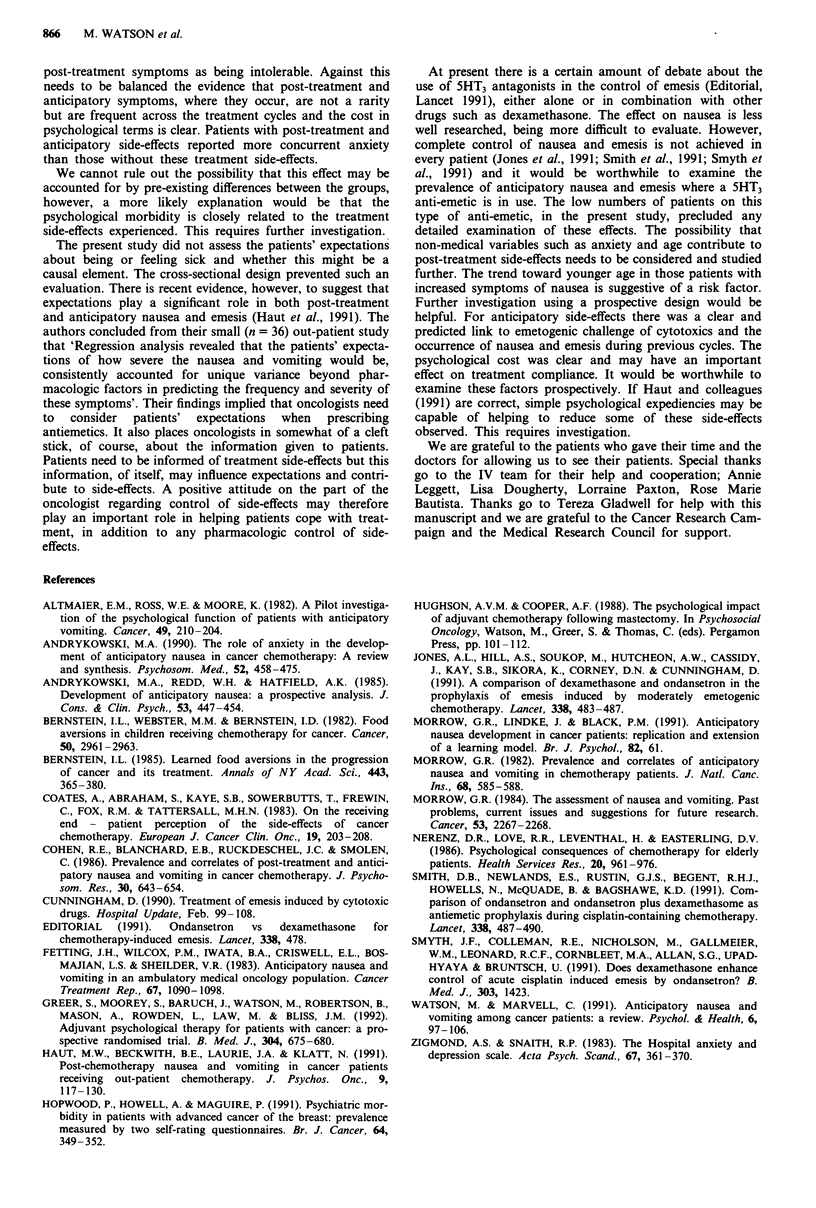
Selected References
These references are in PubMed. This may not be the complete list of references from this article.
- Altmaier E. M., Ross W. E., Moore K. A pilot investigation of the psychologic functioning of patients with anticipatory vomiting. Cancer. 1982 Jan 1;49(1):201–204. doi: 10.1002/1097-0142(19820101)49:1<201::aid-cncr2820490139>3.0.co;2-x. [DOI] [PubMed] [Google Scholar]
- Andrykowski M. A., Redd W. H., Hatfield A. K. Development of anticipatory nausea: a prospective analysis. J Consult Clin Psychol. 1985 Aug;53(4):447–454. doi: 10.1037//0022-006x.53.4.447. [DOI] [PubMed] [Google Scholar]
- Andrykowski M. A. The role of anxiety in the development of anticipatory nausea in cancer chemotherapy: a review and synthesis. Psychosom Med. 1990 Jul-Aug;52(4):458–475. doi: 10.1097/00006842-199007000-00008. [DOI] [PubMed] [Google Scholar]
- Bernstein I. L. Learned food aversions in the progression of cancer and its treatment. Ann N Y Acad Sci. 1985;443:365–380. doi: 10.1111/j.1749-6632.1985.tb27086.x. [DOI] [PubMed] [Google Scholar]
- Bernstein I. L., Webster M. M., Bernstein I. D. Food aversions in children receiving chemotherapy for cancer. Cancer. 1982 Dec 15;50(12):2961–2963. doi: 10.1002/1097-0142(19821215)50:12<2961::aid-cncr2820501243>3.0.co;2-l. [DOI] [PubMed] [Google Scholar]
- Coates A., Abraham S., Kaye S. B., Sowerbutts T., Frewin C., Fox R. M., Tattersall M. H. On the receiving end--patient perception of the side-effects of cancer chemotherapy. Eur J Cancer Clin Oncol. 1983 Feb;19(2):203–208. doi: 10.1016/0277-5379(83)90418-2. [DOI] [PubMed] [Google Scholar]
- Cohen R. E., Blanchard E. B., Ruckdeschel J. C., Smolen R. C. Prevalence and correlates of posttreatment and anticipatory nausea and vomiting in cancer chemotherapy. J Psychosom Res. 1986;30(6):643–654. doi: 10.1016/0022-3999(86)90098-x. [DOI] [PubMed] [Google Scholar]
- Greer S., Moorey S., Baruch J. D., Watson M., Robertson B. M., Mason A., Rowden L., Law M. G., Bliss J. M. Adjuvant psychological therapy for patients with cancer: a prospective randomised trial. BMJ. 1992 Mar 14;304(6828):675–680. doi: 10.1136/bmj.304.6828.675. [DOI] [PMC free article] [PubMed] [Google Scholar]
- Hopwood P., Howell A., Maguire P. Psychiatric morbidity in patients with advanced cancer of the breast: prevalence measured by two self-rating questionnaires. Br J Cancer. 1991 Aug;64(2):349–352. doi: 10.1038/bjc.1991.304. [DOI] [PMC free article] [PubMed] [Google Scholar]
- Jones A. L., Hill A. S., Soukop M., Hutcheon A. W., Cassidy J., Kaye S. B., Sikora K., Carney D. N., Cunningham D. Comparison of dexamethasone and ondansetron in the prophylaxis of emesis induced by moderately emetogenic chemotherapy. Lancet. 1991 Aug 24;338(8765):483–487. doi: 10.1016/0140-6736(91)90554-3. [DOI] [PubMed] [Google Scholar]
- Morrow G. R., Lindke J., Black P. M. Anticipatory nausea development in cancer patients: replication and extension of a learning model. Br J Psychol. 1991 Feb;82(Pt 1):61–72. doi: 10.1111/j.2044-8295.1991.tb02382.x. [DOI] [PubMed] [Google Scholar]
- Morrow G. R. Methodology in behavioral and psychosocial cancer research. The assessment of nausea and vomiting. Past problems, current issues and suggestions for future research. Cancer. 1984 May 15;53(10 Suppl):2267–2280. [PubMed] [Google Scholar]
- Morrow G. R. Prevalence and correlates of anticipatory nausea and vomiting in chemotherapy patients. J Natl Cancer Inst. 1982 Apr;68(4):585–588. [PubMed] [Google Scholar]
- Nerenz D. R., Love R. R., Leventhal H., Easterling D. V. Psychosocial consequences of cancer chemotherapy for elderly patients. Health Serv Res. 1986 Feb;20(6 Pt 2):961–976. [PMC free article] [PubMed] [Google Scholar]
- Smith D. B., Newlands E. S., Rustin G. J., Begent R. H., Howells N., McQuade B., Bagshawe K. D. Comparison of ondansetron and ondansetron plus dexamethasone as antiemetic prophylaxis during cisplatin-containing chemotherapy. Lancet. 1991 Aug 24;338(8765):487–490. doi: 10.1016/0140-6736(91)90555-4. [DOI] [PubMed] [Google Scholar]
- Smyth J. F., Coleman R. E., Nicolson M., Gallmeier W. M., Leonard R. C., Cornbleet M. A., Allan S. G., Upadhyaya B. K., Bruntsch U. Does dexamethasone enhance control of acute cisplatin induced emesis by ondansetron? BMJ. 1991 Dec 7;303(6815):1423–1426. doi: 10.1136/bmj.303.6815.1423. [DOI] [PMC free article] [PubMed] [Google Scholar]
- Zigmond A. S., Snaith R. P. The hospital anxiety and depression scale. Acta Psychiatr Scand. 1983 Jun;67(6):361–370. doi: 10.1111/j.1600-0447.1983.tb09716.x. [DOI] [PubMed] [Google Scholar]


